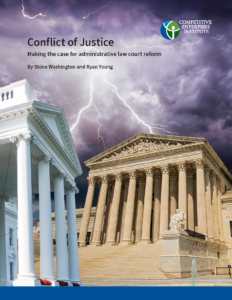CEI Report on Agency Adjudication Reform

Today, the Competitive Enterprise Institute has released a new report, by Ryan Young and Stone Washington, entitled Conflict of Justice: Making the Case for Administrative Law Court Reform. Here’s a taste of the report, from conclusion:
Administrative law courts are unfair and regressive. They violate the separation of powers. They do not relieve regular court backlogs, and they do not necessarily offer better expert knowledge in many cases. They also unjustly empower agencies to blend executive and judicial powers, while providing a prolonged process that drains a private litigant of valuable time and money.
ALCs are ripe for reform, but because most people do not even know that ALCs even exist, there has been little popular push for reform. When people do find out about ALCs, they tend not to like what they see. This is as true in the judiciary as it is with regular people, as the Jarkesy, Axon, and Cochran cases show. Congress needs to reform ALCs, either by moving them to the judicial branch, or by funding a magistrate-style system where circuit courts oversee ALC-like bodies.
This is a provocative report on a very important topic in administrative law. As Aaron Nielson, Melissa Wasserman, and I argue in a new draft paper Saving Agency Adjudication, we don’t think that it is a very realistic or good proposal to have Congress move to federal courts the millions of cases that more than 13,000 federal agency adjudicators decide each year.
Especially when it comes to public benefits adjudications like social security, veterans, and immigration benefits or Medicare reimbursement claims, Congress has wisely decided to create agency adjudication systems to make the process faster and cheaper for claimants (and the government) as well as to help advance efficiency (decrease backlogs and decision times), inter-decisional consistency, and adjudicator efficiency and effectiveness. It would be a disaster, for instance, for federal courts to be adjudicating hundreds of thousands of social security benefits cases in the first instance, instead of the nearly 2,000 administrative law judges who currently decide those cases each year. We’d have more backlogs, more inconsistencies in decisions concerning similar claims, and less expertise in the process, not to mention that claimants would have to spend more time and money to litigate in federal court.
It seems the real target of the CEI report is the small subset of agency adjudications that are enforcement related and there’s a possibility of civil penalties. If members of Congress are interested in agency adjudication reform, the focus should be on this much smaller subset. I still worry about the potential massive disruption here. In light of that concern, David Zaring and I have a new draft essay that recommends what I think is a more modest path forward—i.e., a regulated party’s right to remove civil penalty adjudications to federal court.



